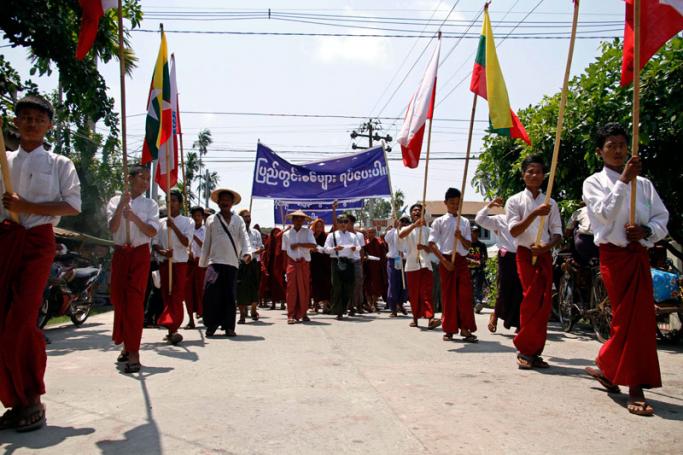Thousands of people protested against ongoing fighting in Arakan State in towns across the state on 1 May.
Protests were held in Sittwe, Mrauk U, Pauktaw, Ponnagyun, Minbya, Rathedaung, Buthidaung, and Maungdaw.
The protesters were calling for the Myanmar Army to halt offensives against the Arakan Army (AA) and for the Arakan Army and Union Government to hold meetings to come up with political solutions to the fighting. They also called for all those unfairly sent to prison for having ties to the AA to be released and for the Myanmar Army to stop violating the human rights of the Arakan people.
About 10,000 people protested in Sittwe.
One of the organisers of the Sittwe protest, KoYazar Min Aung said to Narinjara News: “We are protesting for the government to immediately carry out a peace process, to release the people that have been detained and imprisoned on suspicion [of having ties with AA], and to stop recruiting innocent civilians as porters.”
Another organiser, Daw Kyawt Sein, the chairperson of the Arakan AlinTagar Group said: “We want the Myanmar Army to stop launching offensives against the Arakan Army. We want them to stop because the Arakan people living in rural areas of Arakan State have been suffering a lot. The Myanmar Army has been using Arakan people as porters and overworking them. The Arakan people have to flee safe areas because they fear being forced to overwork.”
Around 5,000 people gathered Shite-Thaung Temple in Mrauk U before marching round the town.
Sayadaw WunnaTharya, a monk from OoGaung Monastery in MraukOo said: “We are holding a protest to demand a halt to the fighting. In order to stop the fighting we must first analyse why the fighting broke out. Fighting breaks out in Myanmar due to the differences between the [ethnic] states and central [Myanmar], it is due to inequality. We believe the wars will end if the government and the [army] Commander-in-Chief can sit together with ethnic leaders at a table and solve the needs of the ethnic people.”
Over 4,000 people protested in Pauktaw.
The Pauktaw protest leader KoZaw Min Oo said to Narinjara News: ““We want peace, that is why we are protesting. It is especially important to halt the wars and human rights violations.”
He also said that the authorities banned protesters from using the word army [tatmadaw in Myanmar] in reference to the Arakan Army (AA). Instead protesters in Pauktaw had to call them the Arakan armed group.
U SandaThiri, the chief abbot of Sanda Yama Monastery in Pauktaw Township, said: “We want the Union Government to consider the Arakan people’s demand to halt the fighting. You can’t solve peace like this. You need to discuss this peacefully at a table.”
Over 1,000 people protested in Minbya and Rathedaung and according to local resident KoMyoNaing about 3,000 people protested in Ponnagyun.
The Minbya protest leader U Ba Thein said: “We demand a halt to fighting and human rights violations and political solutions to political problems. We expect the new government to consult the public on their views and to solve the peace [issues] that the previous government was unable to do.”
The leader of the Rathedaung protest, U Hla Myint said: “If the new Union Government and the NLD are unable to solve the public’s demands, we will need to make bigger demands. We will submit our demands to parliament.”
Fighting broke out between the Myanmar Army and the AA in the mountains in Rathedaung Township, Ponnagyun Township, and Buthidaung Township from 16 to 22 April. Thousands of innocent Arakan people have fled and are in need of relief aid.
Courtesy of BNI












